The beginning of the Russian-Polish war 1654 — 1667 Part of 2
On July 29, a detachment of Prince Yakov Cherkassky and the Cossacks of Zolotarenko under Vilna attacked the forces of the hetmans of Radzivil and Gonsevsky. The battle went on for several hours, the Polish-Lithuanian troops were defeated and fled across the river Vilia. 31 July Russian troops occupied Vilna. On August 9, Tsar Alexey was informed about the seizure of Kovno, and of August 29 - about the capture of Grodno.
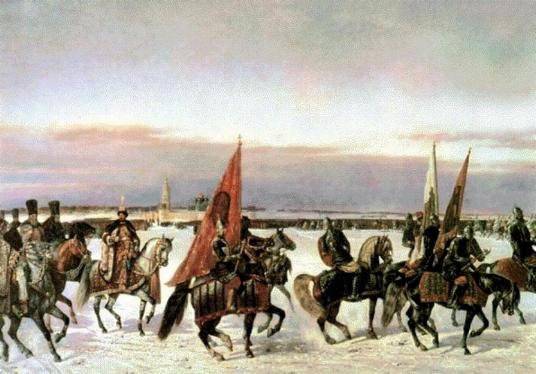
Departure of Tsar Alexei Mikhailovich to review the troops
In the spring of 1655, the boyar Andrei Buturlin was sent to Small Russia with an army. Russian troops united with the Cossacks of Bogdan Khmelnitsky and moved to Galicia. September 18 troops hetman Khmelnytsky and voivode Buturlin came to Lviv. Crown hetman Stanislav Potocki retreated from Lviv and stood in well-prepared positions near the Salty Town. Khmelnitsky and Buturlin, besieging Lviv, sent troops against the Poles under the command of Prince Grigory Romodanovsky and Mirgorod colonel Gregory Lesnitsky.
Getman Pototsky was confident in the inaccessibility of his positions, which were protected by a marshy lowland near the Vereshchitsa River and a pond. The only way to approach the Polish fortified camp was a dam between the pond and the Vereshchitsa River. However, the Cossacks were able to make passages on the channels and forcing them overturned the Polish guards and the detachment sent to them for help. At the same time, the Russian troops went on the attack. At first, Polish troops offered stubborn resistance. However, the Poles soon discovered the approach of a new detachment. It was a detachment of the Przemyshelsky Commonwealth of Destruction (militia), which was sent to join the Polish hetman. But in the confusion of battle, the Poles considered that the main forces of Khmelnitsky and Buturlin were approaching. Polish soldiers panicked and ran. Russian soldiers and Cossacks got the horseman of the crown hetman, banners, timpani, artillery, the whole wagon train and many prisoners. Many Poles were killed during the persecution. This victory was of strategic importance - the Polish army no longer existed in the southern theater of operations. The army of Buturlin and Khmelnitsky received complete freedom of action.
Lviv did not take. Khmelnitsky did not want to bother with the siege of the city and, taking a ransom from Lviv, retreated to the east. Another part of the Russian army under the command of Danila Vygovsky and the Russian governor Peter Potemkin laid siege to Lublin. The city surrendered "to the king's name", that is, the townspeople swore allegiance to Tsar Alexei Mikhailovich.
Another Russian corps advanced in early September 1655 on riverboats from Kiev up the Dnieper River and then along the Pripyat River. The troops commanded by Prince Dmitry Volkonsky. September 15 river army approached Turov. Local residents did not resist and swore allegiance to the king. Volkonsky did not linger and moved dry way to the city of Davydov (Davyd-City). The Lithuanian army came forward to meet. September 16 battle took place. The Lithuanians after a brief battle ran, and the Russian warriors on the enemy's shoulders broke into the town. The settlement burned down. Residents and surviving Lithuanian warriors fled through another gate. Russian troops returned to the courts and went to the city of Stolin. September 20 repeated events at Davydov. The Lithuanians went out to meet, then ran, and the Russian warriors on their shoulders broke into the city. Stolin also burned out. September 25 ship's army came to Pinsk. It was not possible to land near the city, rifle-gun fire prevented. Then Volkonsky landed an army a few miles below the city. When approaching the city, the scenario of the fall of the city was repeated: a head-on battle, a quick capture of the city and a fire. After a two-day rest, the detachment moved on. In the village of Stakhov, Russian troops defeated a detachment of Lithuanian troops, then they took the oath of oath to the inhabitants of the cities of Cajan and Lakhva. After the victorious expedition, the Volkonsky detachment returned to Kiev.
Another Russian army under the command of the princes Semyon Urusov and Yury Baryatinsky was advancing from Kovno to Brest. The Russian command did not count on serious resistance, and only part of the troops stationed in the Kovna area took part in the march. October 23 1655 of the year in 150 versts from Brest in the town of Belye Pesky, the Russian army defeated the squad of the local gentry. Part of the Lithuanian gentry swore to the Russian Tsar. At the beginning of November, near Brest, the Russian army met the army of the new Lithuanian hetman Pavel Sapegi (the former hetman Radzivill changed Poland and appealed to the Swedish king to accept Lithuania into Sweden).
Prince Urusov, confident that he would not be resisted, left for Brest with a part of his detachment, leaving infantry and cannons in the rear. Urusov was so confident in the situation that he even sent people to prepare the courtyards in Brest for standing soldiers. This was due to the fact that Sapieha had already held talks with Fedor Rtischev. The new great Lithuanian hetman asked for a truce and promised that there would be no hostile actions on his part.
However, on November 11, Sapieha attacked Urusov "at the break of the field" during negotiations. Russian noble cavalry was not ready for battle and it was scattered. The prince with the troops retreated behind the Bug and occupied the defenses behind the wagon train. But soon the Russian troops drove out from there. The Russians retreated to the village of Verkhovichi in 25 versts from Brest. The Poles came to the village and blocked the Russian squad. For two days the Russian troops were surrounded, "they stood on horses for two days and two nights."
Sapieha sent parliamentarians and demanded to surrender. Prince Urusov refused. November 17 Sapieha began to prepare troops to storm the Russian positions. However, Urusov preempted the enemy and suddenly hit twice the superior opponent. Luck was on the side of the Russian troops. The Poles did not expect this blow. The Novgorod regiment, under the command of Urusov himself, attacked the hetman infantry and nearby companies, and in the other direction, troops of Prince Yury Baryatinsky attacked a hussar company of the hetman. The hussars and advanced units of the hetman were destroyed by a desperate attack of the Russian troops. The Lithuanian army panicked and fled. Russian troops drove the enemy several miles. As trophies took 4 guns, 28 banners. After the victory, Prince Urusov returned to Vilna. In general, the campaign was successful. During the campaign, the Russian tsar took the oath to the nobles of the Grodno, Slonim, Novogrudok, Lida, Volkovysk, Oshmyany and Troksky povets. Shlyakhta began to massively come to Vilna to take the oath to the king. The Lithuanian colonels with their troops entered the Russian service.
The 1655 campaign of the year was successful for the Russian army. By the end of 1655, almost all of Western Russia, except for Lvov, was liberated from the forces of the enemy. The fighting was moved to the territory of Poland.
Source: http://www.runivers.ru/
Swedish intervention
I must say that Prince Urusov’s campaign took place after the start of the Russian-Polish armistice talks. Moreover, Warsaw began negotiations not so much because of the success of the Russian troops (the lords were not going to give Moscow the land anyway), but because of the intervention of the third force - the Swedish army.
In 1648, the Peace of Westphalia was signed, ending the Thirty Years War. This war led to the fact that the Swedish king Gustav-Adolf carried out a radical military reform, as a result of which the Swedish army became the strongest in Europe. The Thirty Years War was extremely successful for Sweden, which began to turn into an empire. Sweden received Western Pomerania, the city of Stettin with part of Eastern Pomerania, the island of Rügen, the city of Wismar, the archdiocese of Bremen and the bishopric Forden. Thus, almost all the mouths of the navigable rivers of Northern Germany came under the control of the Swedes. The Baltic Sea began to turn into a “Swedish lake”. It remains only to take away the coastal territory from the Commonwealth.
6 June 1654, Queen Christina, denied in favor of Carl-Gustav (the queen was his cousin), commander of the Swedish army in Germany. The new king received the name of Charles X Gustav. The Swedish treasury was empty, ravaged by the senseless luxury of the court of Queen Christina and the distribution of crown lands. The best army in Europe has been idle for a considerable time. Sweden wanted to get under its full control the trade of the Baltic, and for this it was necessary to deprive Poland of access to the sea. In addition, the success of the Russian troops in the 1654 campaign of the year greatly disturbed the Swedish elite. Stockholm did not want to get at hand a powerful country. With the occupation of the lands of the Grand Duchy of Lithuania on the Western Dvina, the Russian state gained control of the territories from which Riga was supplied and acquired a bridgehead for an attack on Swedish Livonia. Russia could return to the plans of Ivan the Terrible, who planned to return the Baltic States under Russian control.
Commonwealth was weakened by the liberation war under the authority of Bogdan and the war with Russia. The reason to solve several important tasks at once was excellent. In addition, the Polish gentry themselves were asking for war. In the course of the abdication of Queen Christina, Polish King Jan Casimir suddenly remembered the rights of his father Sigismund III to the Swedish throne, although both his father and brother Vladislav had long denied him. Jan Casimir demanded compensation for waiving his rights to the Swedish throne.
Poles refused to union with Sweden. In December, 1654 of the year, the Swedish Rixrod (State Council under the Scandinavian Kings) decided to intervene in the war. In order to prevent the strengthening of the Russian kingdom, the Swedes wanted to form an alliance with the weakened Polish-Lithuanian Commonwealth. For this, the Polish king had to give up the rights to Livonia, agree to a Swedish protectorate over Courland and to concessions in East Prussia. This should have led to the transformation of the Baltic Sea into a “Swedish lake”. Sweden gained complete control over trade in the Baltic region. However, the Polish king refused to union with Sweden.
As a result, Rixrod decided to start the war and set the time - Spring-Summer 1655. Fortunately, Sweden had its “fifth column” in the Commonwealth. Part of the tycoons of the Commonwealth entered into negotiations with Sweden on the “patronage”. Thus, the great hetman of Lithuania Janusz Radziwill and the Vilna bishop conducted active negotiations with Sweden. Lithuanian magnates were ready to support the election of the Swedish king to the throne of Poland.
By the summer of 1655, the campaign plan was ready. Field Marshal Arvid Wittenberg's army was supposed to strike from the western direction, from Swedish Pomerania, over the lands of Wielkopolska. From the north, the Swedish army was advancing from Livonia, Sweden. The governor of Livonia, Sweden, Magnus Delagardi, was to capture the entire north of the Grand Duchy of Lithuania.
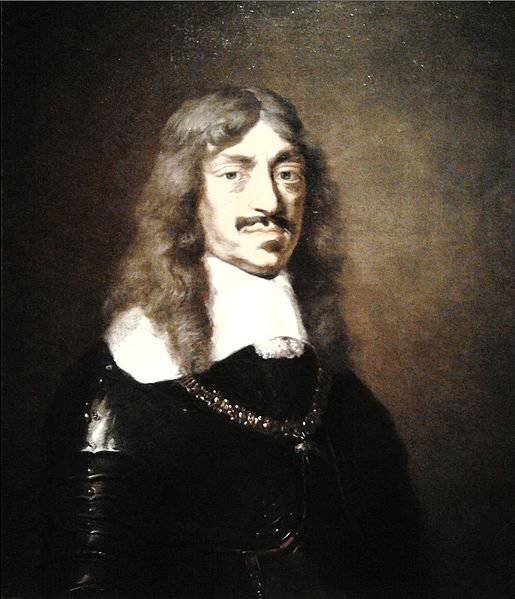
Jan II Casimir
July 5 Field Marshal Arvid von Wittenberg with the first Swedish army made from Szczecin. 19 July he crossed the Polish border. At the same time, the second Swedish army led by the king landed at the port of Wolgast. On July 25, the Wielkopolska Militia, which had been surrounded and subjected to artillery shelling, capitulated. The magnates and gentry of Great Poland recognized the Swedish king as their protector. Local authorities have entered into a separate agreement with the Swedish command. Greater Poland (Poznan and Kalisz voivodship) submitted to the Swedish king. Thus, the Swedish army opened its way into the depths of Poland.
Commonwealth swept the mass betrayal. The great Lithuanian hetman Janusz Radziwill and Bishop of Vilnius Jerzy Tyszkiewicz went over to the side of the Swedes. Polish magnates and gentry massively went over to the side of the Swedish king. Part of the great Polish dignitaries asked the Brandenburg Elector for protection and even expressed their readiness to give him the Polish throne.
29-30 July, Lewenhaupt’s forces began to force Western Dvina. 31 July von Wittenberg occupied the city of Poznan without a fight. 14 August, the army of the Swedish king crossed the Polish border. Sieradz province, headed by voivod Jan Konetspolsky, did not resist and went over to the side of the Swedish king. On August 24, under Konin, the army of King Charles X Gustav was joined by von Wittenberg troops. September 2 in the Battle of Sobota, the Swedish army defeated the Polish troops. The Polish king Jan-Casimir with the remnants of the army threw the capital and retreated into the interior of the country. This page is sad for Poland. stories received the name "Flood" ("Swedish Flood").
September 8 Swedes without resistance occupied Warsaw. September 16 in the battle of Zharnuvom Polish army suffered another heavy defeat. After this defeat, most of the gentry militia ran home. Polish king Jan Casimir fled to Silesia. September 25 The Swedes besieged Krakow, which lasted until October October 17, and then surrendered. Successfully acted Swedish troops and in other directions. In late September, the Mazovian militia was defeated. Mazovia submitted to the Swedish king. October 3 in the battle of Voynich was defeated the corona hetman Stanislav Lyantskoronsky. The remnants of his army capitulated and swore allegiance to the Swedes. October 21 of Krakow, Sandomierz, Kiev, Russian, Volyn, Lubelsk and Belz regions of Voivodship recognized the authority of Charles X Gustav.
In this way, for four months, Poland suffered a military-political catastrophe. Almost the entire territory of indigenous Poland (Wielkopolska, Malopolska and Mazovia) was occupied by the Swedes. In all the major and most important Polish cities and fortresses stood the Swedish garrisons. Most of the Polish magnates went over to the side of the Swedish monarch. Some even took part in the conquest of their own country. Actually, the mass betrayal of the Polish gentry and gentry predetermined the lightning wreck of Poland.
However, individual centers of resistance — the Yasnogorsk Monastery in Czestochowa, Polish Prussia, etc. — continued the struggle and saved Poland. Swedish blitzkrieg scared and other states. Brandenburg Elector and Duke of Prussia Friedrich Wilhelm I Hohenzollern spoke out against Sweden. Poland was also supported by the Netherlands, which provided assistance in the defense of Danzig. The great corona hetman Stanislav Pototsky called on the Poles to rise to a nationwide struggle. The heroic defense of the Poles of the Yasnogorsk Monastery became an example for the whole country. Peasant uprisings began to flare up against the Swedish invaders, and the partisans began to gain first victories. The Swedes won open battles, but they could not beat the people.
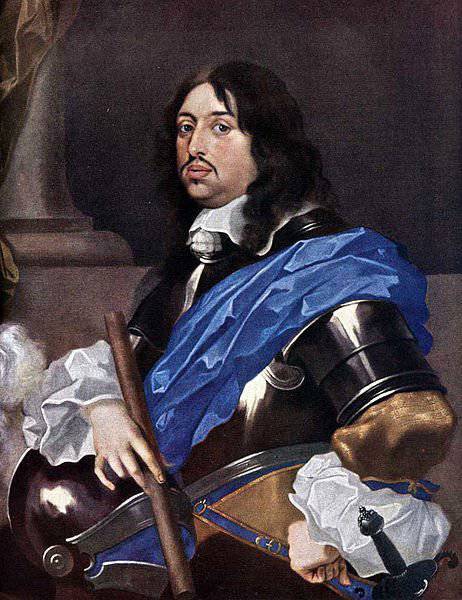
Karl X Gustav
Vilna truce
Even before the invasion of Poland, the Swedish king Charles X Gustav sent Ambassador Rosenlinde to the Russian tsar with a diploma explaining the reasons that prompted Sweden to start this war. Russia was offered military soybeans against the Commonwealth. Sweden was ready to partition the Commonwealth. In July, 1655, Tsar Alexei Mikhailovich received the Swedish ambassador in Smolensk.
From the point of view of common sense, the entry of Sweden into the war against Poland was a great success for Russia. After all, Stockholm offered Warsaw a military alliance against Moscow. This could lead to the situation of the Livonian war of the times of Ivan the Terrible, when the Russian kingdom had to exhaust all its forces on the western and north-western fronts and repel attacks of the Crimean-Turkish troops in the south. Despite all the successes and victories of the Russian army in the 1654-1655 campaigns, the situation was dangerous. The Russian army occupied most of the western Russian lands, but Poland retained its military power. In addition, all neighboring states were concerned about the Russian success. The Swedes were afraid of the Russians approaching Riga, the Turks - the appearance of Russians in Volyn. Cossack elite could not be trusted completely. Among the Cossack officers grew discontent, which will soon lead to the "Ruin" (civil war). Bogdan suffered from alcoholism, went into a long binge, losing control over the situation. His days were numbered.
therefore partition of the Commonwealth, which was proposed by Sweden, was very profitable for Russia. It was the perfect option. Sweden took over the indigenous Polish lands. Sweden would just choke on a “Polish piece.” She had no opportunity to "digest" the great Poland. Sweden had to fight not only with Poland, but also with other European states. As a result, the Northern War 1655 — 1660. ended with the fact that the Swedes were able to officially secure the right to Estonia and most of Livonia. All the fruits of the outbreak of war were lost.
Russia, on the other hand, could quietly secure the West Russian lands, while the Poles and the Swedes would exhaust each other in a long war. However, the Russian Tsar Alexei Mikhailovich clearly overestimated the success of the first two years of the war. 17 May 1656, Alexey Mikhailovich declared war on Sweden. Russian troops under the command of Peter Potemkin moved to the shores of the Gulf of Finland. The elderly patriarch Nikon, who took tough care of the young tsar and imagined himself almost a “king of kings”, not only did not dissuade Alexey “The Quietest”, but literally incited him to new seizures. He even blessed the Don Cossacks, who were sent to help Potemkin, to capture Stockholm. Overcrowded with pride, the patriarch already saw himself as the new spiritual ruler of Poland and Lithuania, the winner of Sweden.
A hard war began with the Swedes, who were a much more serious enemy than the Poles. As a result, Moscow had to urgently seek a truce with Poland. By the beginning of July 1656, all hostilities against the Polish-Lithuanian troops, who remained loyal to the Polish king, were stopped. 30 July in the city of Vilna opened peace talks. However, the negotiation process came to a standstill because of the status of Little Russia. Neither side wanted to give it up. At the same time, neither Warsaw nor Moscow were willing to interrupt the negotiations. The negotiation process dragged on. Poland was weak. And Russia did not want to continue the war until the campaign with Sweden was completed. October 24 were able to conclude only the so-called Vilensky truce. Both sides agreed to fight the Swedes and not to conclude a separate peace.
The deterioration of the political situation in Little Russia
Negotiations in Vilna were held without representatives of Hetman Bogdan. This was done at the insistence of the Polish side. As a result, the enemies of Russia were able to inspire the Cossack leaders to believe that Russia had betrayed them and agreed to transfer the Hetmanate back to the Polish crown. Cossacks believed disinformation Polish diplomats, which was one of the prerequisites of "Ruins". In the future, Russia will have to fight on two fronts, against Poland and against Hetman Vyhovsky (he was elected after the death of Bohdan Khmelnytsky).
During the negotiations in Vilna, relations between Bogdan and the Moscow government deteriorated. Bogdan considered the truce with Poland a mistake and was right. In Chigirin in 1656-1657 Negotiations were held with Polish and Swedish representatives. Bogdan even rendered some military assistance to the Swedish troops.
In June, the Russian embassy headed by okolnichy Fyodor Buturlin and the clerk Vasily Mikhailov arrived in Chigirin 1657. Buturlin demanded an explanation about the relations between the hetman and the Swedes, with whom Russia is at war. Bogdan replied that he was always on good terms with the Swedes, and expressed surprise that the king began a new war, not completing the old one. Bogdan correctly noted: "The Crown of Poland has not yet captured the world and they have not yet committed the world, but they have started a war with another state, with the Swedes."
The hetman was seriously ill and Buturlin proposed that his son Yuri, whom he was happy to choose as the successor of Bogdan, swore an oath to Tsar Alexei Mikhailovich. However, Bogdan refused, saying that his son would take the oath after his death. These were the last talks of the Moscow ambassadors with the great hetman. Bogdan died on July 27 (August 6) of the year 1657. Formally, the will of the deceased was fulfilled on the Chigirinsky Rada 26 August (5 September) 1657 g. Starshina transferred the hetman's authority to clerk Ivan Vyhovsky, but only until Yury reached the age of majority. On the Korsun Rada 21 in October 1657, the Vyhovsky already became a sovereign hetman.
This led to a split of the Cossacks. The Cossacks did not participate in the elections and refused to recognize Vyhovsky as a hetman. Among the opponents of Vyhovsky there were rumors that he was not a “natural Cossack”, but a “lyakh”, and was going to betray the Cossacks. Soon the betrayal of Vyhovsky was confirmed. The new hetman began repressions against his opponents, and civil war broke out in Little Russia (“Ruin”). Vyhovsky in 1658 year signed the Hadiach Treaty with the Poles. According to him, the "Grand Duchy of Russia" (Hetmanate) was to pass under the authority of the Polish king and become autonomy. Vyhovsky with his troops went over to the side of the Poles.
As a result, the truce between Russia and Poland turned into a strategic defeat for Moscow. The Russian government overestimated its strength, starting a war with Sweden before it made peace with Poland. Opportunities to influence the Polish authorities overestimated and could not force the Poles to make peace. The Russian army in the fight against the Swedes was weakened, and the Commonwealth received opportunities to recuperate. In Little Russia began a civil war. Troops with Poland continued until the 1667 year, and the accession of most of the Western Russian lands had to be postponed until the second half of the XVIII century.
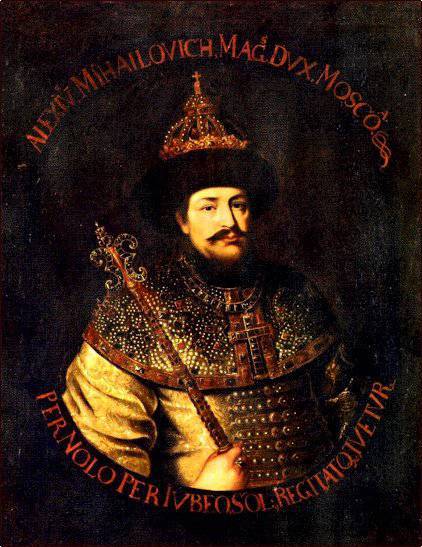
Tsar Alexey Mikhailovich ("Quietest")
- Alexander Samsonov
- The beginning of the Russian-Polish war 1654 — 1667.
The beginning of the Russian-Polish war 1654 — 1667 Part of 2
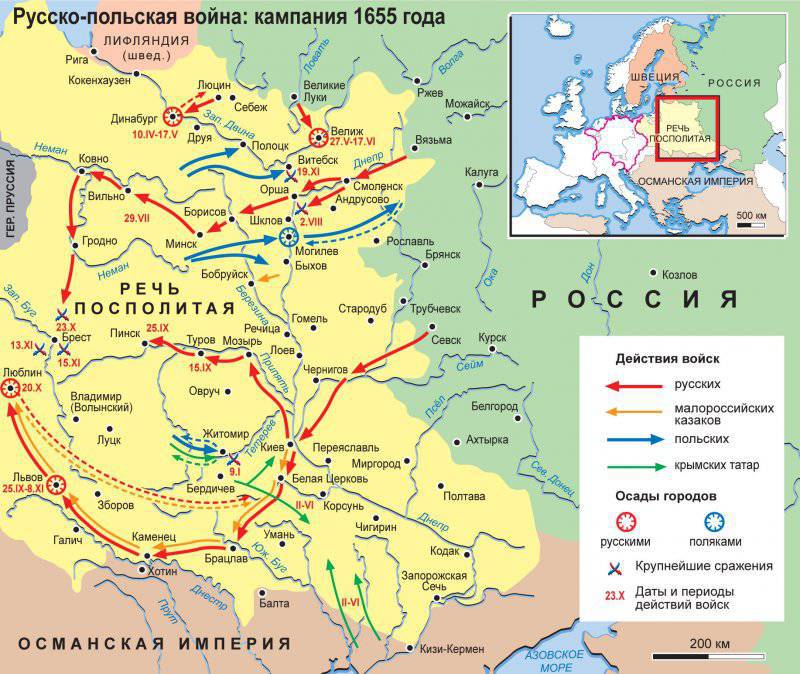
Information